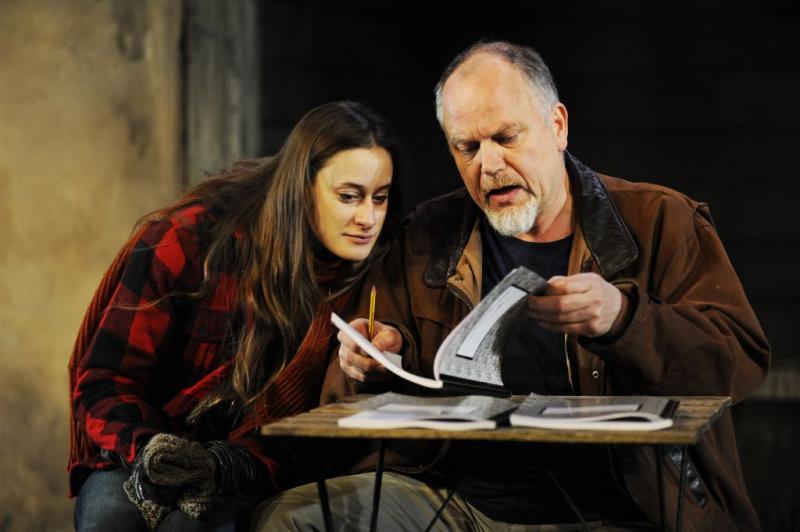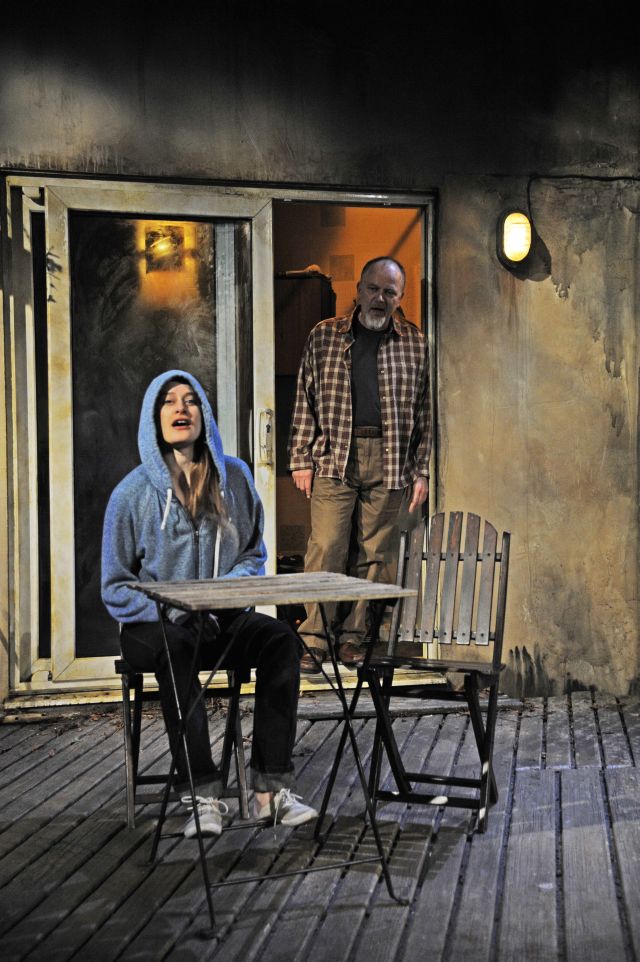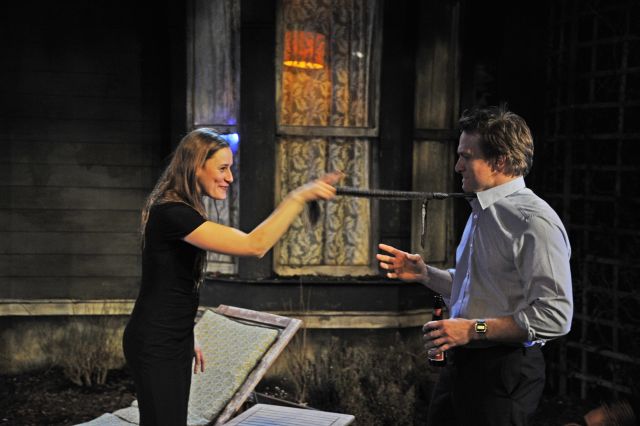Proof, Menier Chocolate Factory | reviews, news & interviews
Proof, Menier Chocolate Factory
Proof, Menier Chocolate Factory
Revival of onetime Donmar entry proves there is life after Gwyneth

Mathematicians are a breed apart, bandying numbers about in a way that few outside their magic circle can fully understand. David Auburn's Pulitzer Prize-winning play uses this exclusiveness to investigate the complex relationship between a father and daughter.
Robert, a brilliant academic whose ground-breaking research inspired a generation of devoted students before he became mentally ill, has recently died. His daughter Catherine (Mariah Gale, pictured below right with Matthew Marsh as Robert), now 25, has spent years caring for him in their dilapidated Chicago home, curtailing her own university career to do so. She knows that she has inherited something of her father's mental ability; she fears she may also have inherited his mental instability. When Hal, one of Robert's last postgraduate students and now himself an ambitious academic, searches among his mentor's nonsense-filled notebooks for any overlooked ideas, Catherine reveals a sensationally original proof which she claims to be her own work.
 The "proof" of the title also refers to Catherine's need to persuade Hal and her financial analyst sister Claire, who threatens to whisk her to New York and possible treatment, that she is capable of such original thought. More importantly, she must prove to herself that she is her own person, not a female version of her father, inevitably following where he has led.
The "proof" of the title also refers to Catherine's need to persuade Hal and her financial analyst sister Claire, who threatens to whisk her to New York and possible treatment, that she is capable of such original thought. More importantly, she must prove to herself that she is her own person, not a female version of her father, inevitably following where he has led.
When it was first staged in London, at the Donmar in 2002, Proof provided Gwyneth Paltrow with the opportunity to show that she could act on stage. A film duly followed. Gale, Charleson Award winner and experienced in Shakespeare (Ophelia to David Tennant's Hamlet) and Chekhov (Olga in Three Sisters at the Young Vic) is already widely respected for her stage work. Here she turns in a stunning performance: contrary and funny as a child when she jumps on her garden swing in mid-conversation, convincingly quick and intelligent, ironic and acerbic, with tears of grief and confusion always just below the surface.
Jamie Parker's geeky but attractive and charming Hal (who plays in a band of mathematicians for whom three minutes' silence entitled "Imaginary Number" is a hilarious joke) provides a perfect foil. (Parker and Gale are pictured below.) They are ably supported by Matthew Marsh as sad Robert and Emma Cunniffe as practical Claire.
 Auburn's play could seem too clever by half, merely a collection of ideas - heredity, the place of women in science, whether there is a relationship between genius and instability - but director Polly Findlay and her cast imbue it with welcome, well-observed humanity. For instance, a scene in which, in flashback, Catherine gently covers her father with her jacket against the cold is followed by one in which Claire treats her sister with exactly the same humouring gesture but out of bossiness rather than sympathy.
Auburn's play could seem too clever by half, merely a collection of ideas - heredity, the place of women in science, whether there is a relationship between genius and instability - but director Polly Findlay and her cast imbue it with welcome, well-observed humanity. For instance, a scene in which, in flashback, Catherine gently covers her father with her jacket against the cold is followed by one in which Claire treats her sister with exactly the same humouring gesture but out of bossiness rather than sympathy.
Helen Goddard's grimy porch-and-decking set makes the most of the Menier's limited space and suggests neglected love as well as a particular location.
This is a fresh, funny and touching revival, putting the emphasis where it should be, on the interplay between the characters; the nature of the mathematical proof is secondary. Catherine has to prove ownership of her life and her future as much as of her calculation.
rating
Explore topics
Share this article
The future of Arts Journalism
You can stop theartsdesk.com closing!
We urgently need financing to survive. Our fundraising drive has thus far raised £49,000 but we need to reach £100,000 or we will be forced to close. Please contribute here: https://gofund.me/c3f6033d
And if you can forward this information to anyone who might assist, we’d be grateful.

Subscribe to theartsdesk.com
Thank you for continuing to read our work on theartsdesk.com. For unlimited access to every article in its entirety, including our archive of more than 15,000 pieces, we're asking for £5 per month or £40 per year. We feel it's a very good deal, and hope you do too.
To take a subscription now simply click here.
And if you're looking for that extra gift for a friend or family member, why not treat them to a theartsdesk.com gift subscription?
more Theatre
 50 First Dates: The Musical, The Other Palace review - romcom turned musical
Date movie about repeating dates inspires date musical
50 First Dates: The Musical, The Other Palace review - romcom turned musical
Date movie about repeating dates inspires date musical
 Bacchae, National Theatre review - cheeky, uneven version of Euripides' tragedy
Indhu Rubasingham's tenure gets off to a bold, comic start
Bacchae, National Theatre review - cheeky, uneven version of Euripides' tragedy
Indhu Rubasingham's tenure gets off to a bold, comic start
 The Harder They Come, Stratford East review - still packs a punch, half a century on
Natey Jones and Madeline Charlemagne lead a perfectly realised adaptation of the seminal movie
The Harder They Come, Stratford East review - still packs a punch, half a century on
Natey Jones and Madeline Charlemagne lead a perfectly realised adaptation of the seminal movie
 The Weir, Harold Pinter Theatre review - evasive fantasy, bleak truth and possible community
Three outstanding performances in Conor McPherson’s atmospheric five-hander
The Weir, Harold Pinter Theatre review - evasive fantasy, bleak truth and possible community
Three outstanding performances in Conor McPherson’s atmospheric five-hander
 Dracula, Lyric Hammersmith review - hit-and-miss recasting of the familiar story as feminist diatribe
Morgan Lloyd Malcolm's version puts Mina Harkness centre-stage
Dracula, Lyric Hammersmith review - hit-and-miss recasting of the familiar story as feminist diatribe
Morgan Lloyd Malcolm's version puts Mina Harkness centre-stage
 Reunion, Kiln Theatre review - a stormy night in every sense
Beautifully acted, but desperately grim drama
Reunion, Kiln Theatre review - a stormy night in every sense
Beautifully acted, but desperately grim drama
 The Code, Southwark Playhouse Elephant review - superbly cast, resonant play about the price of fame in Hollywood
Tracie Bennett is outstanding as a ribald, riotous Tallulah Bankhead
The Code, Southwark Playhouse Elephant review - superbly cast, resonant play about the price of fame in Hollywood
Tracie Bennett is outstanding as a ribald, riotous Tallulah Bankhead
 The Lady from the Sea, Bridge Theatre review - flashes of brilliance
Simon Stone refashions Ibsen in his own high-octane image
The Lady from the Sea, Bridge Theatre review - flashes of brilliance
Simon Stone refashions Ibsen in his own high-octane image
 Romans: A Novel, Almeida Theatre review - a uniquely extraordinary work
Alice Birch’s wildly epic family drama is both mind-blowing and exasperating
Romans: A Novel, Almeida Theatre review - a uniquely extraordinary work
Alice Birch’s wildly epic family drama is both mind-blowing and exasperating
 The Producers, Garrick Theatre review - Ve haf vays of making you laugh
You probably know what's coming, but it's such great fun!
The Producers, Garrick Theatre review - Ve haf vays of making you laugh
You probably know what's coming, but it's such great fun!
 Not Your Superwoman, Bush Theatre review - powerful tribute to the plight and perseverance of Black women
Golda Rosheuvel and Letitia Wright excel in a super new play
Not Your Superwoman, Bush Theatre review - powerful tribute to the plight and perseverance of Black women
Golda Rosheuvel and Letitia Wright excel in a super new play

Add comment